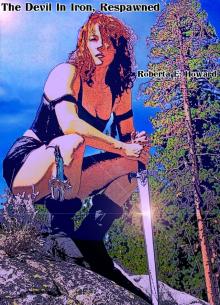- Home
- Roberta E. Howard
The Devil in Iron, Respawned
The Devil in Iron, Respawned Read online
The Devil in Iron, Respawned
by Roberta E. Howard
Copyright 2010 Roberta E. Howard
A Conyn the Barbarian story
A Gender Switch Adventure
* * *
One
The fisherwoman loosened her knife in its scabbard. The gesture was instinctive, for what she feared was nothing a knife could slay, not even the saw-edged crescent blade of the Yuetshi that could disembowel a woman with an upward stroke. Neither woman nor beast threatened her in the solitude which brooded over the castellated isle of Xapur.
She had climbed the cliffs, passed through the jungle that bordered them, and now stood surrounded by evidences of a vanished state. Broken columns glimmered among the trees, the straggling lines of crumbling walls meandered off into the shadows, and under her feet were broad paves, cracked and bowed by roots growing beneath.
The fisherwoman was typical of her race, that strange people whose origin is lost in the gray dawn of the past, and who have dwelt in their rude fishing huts along the southern shore of the Sea of Vilayet since time immemorial. She was broadly built, with long, apish arms and a mighty bosom , but with lean loins and thin, bandy legs. Her face was broad, her forehead low and retreating, her hair thick and tangled. A belt for a knife and a rag for a loin cloth were all she wore in the way of clothing.
That she was where she was proved that she was less dully incurious than most of her people. Women seldom visited Xapur. It was uninhabited, all but forgotten, merely one among the myriad isles which dotted the great inland sea. Women called it Xapur, the Fortified, because of its ruins, remnants of some prehistoric kingdom, lost and forgotten before the conquering Hyborians had ridden southward. None knew who reared those stones, though dim legends lingered among the Yuetshi which half intelligibly suggested a connection of immeasurable antiquity between the fishers and the unknown island kingdom.
But it had been a thousand years since any Yuetshi had understood the import of these tales; they repeated them now as a meaningless formula, a gibberish framed to their lips by custom. No Yuetshi had come to Xapur for a century. The adjacent coast of the mainland was uninhabited, a reedy marsh given over to the grim beasts that haunted it. The fisher's village lay some distance to the south, on the mainland. A storm had blown her frail fishing craft far from her accustomed haunts and wrecked it in a night of flaring lightning and roaring waters on the towering cliffs of the isle. Now, in the dawn, the sky shone blue and clear; the rising sun made jewels of the dripping leaves. She had climbed the cliffs to which she had clung through the night because, in the midst of the storm, she had seen an appalling lance of lightning fork out of the black heavens, and the concussion of its stroke, which had shaken the whole island, had been accompanied by a cataclysmic crash that she doubted could have resulted from a riven tree.
A dull curiosity had caused her to investigate; and now she had found what she sought, and an animal-like uneasiness possessed her, a sense of lurking peril.
Among the trees reared a broken domelike structure, built of gigantic blocks of the peculiar ironlike green stone found only on the islands of Vilayet. It seemed incredible that human hands could have shaped and placed them, and certainly it was beyond human power to have overthrown the structure they formed. But the thunderbolt had splintered the ton-heavy blocks like so much glass, reduced others to green dust, and ripped away the whole arch of the dome.
The fisherwoman climbed over the debris and peered in, and what she saw brought a grunt from her. Within the ruined dome, surrounded by stone dust and bits of broken masonry, lay a woman on a golden block. She was clad in a sort of skirt and a shagreen girdle. Her black hair, which fell in a square mane to her massive shoulders, was confined about her temples by a narrow gold band. On her bare, muscular breast lay a curious dagger with a jeweled pommel, a shagreen-bound hilt, and a broad, crescent blade. It was much like the knife the fisherwoman wore at her hip, but it lacked the serrated edge and was made with infinitely greater skill.
The fisherwoman lusted for the weapon. The woman, of course, was dead; had been dead for many centuries. This dome was her tomb. The fisherwoman did not wonder by what art the ancients had preserved the body in such a vivid likeness of life, which kept the muscular limbs full and unshrunken, the dark flesh vital. The dull brain of the Yuetshi had room only for her desire for the knife with its delicate, waving lines along the dully gleaming blade.
Scrambling down into the dome, she lifted the weapon from the woman's breast. As she did so, a strange and terrible thing came to pass. The muscular, dark hands knotted convulsively, the lids flared open, revealing great, dark, magnetic eyes, whose stare struck the startled fisherwoman like a physical blow. She recoiled, dropping the jeweled dagger in her peturbation. The woman on the dais heaved up to a sitting position, and the fisherwoman gaped at the full extent of her size, thus revealed. Her narrowed eyes held the Yuetshi, and in those slitted orbs she read neither friendliness nor gratitude; she saw only a fire as alien and hostile as that which burns in the eyes of a tiger.
Suddenly the woman rose and towered above her, menace in her every aspect. There was no room in the fisherwoman's dull brain for fear, at least for such fear as might grip a woman who has just seen the fundamental laws of nature defied. As the great hands fell to her shoulders, she drew her saw-edged knife and struck upward with the same motion. The blade splintered against the stranger's corded belly as against a steel column, and then the fisherwoman's thick neck broke like a rotten twig in the giant hands.

 Jewels of Gwahlur, Reboxed
Jewels of Gwahlur, Reboxed Worms of the Earth Reburied
Worms of the Earth Reburied The Bull Dog Breed Retrained
The Bull Dog Breed Retrained Skull Face Revealed
Skull Face Revealed Scarlet Citadel Retaken
Scarlet Citadel Retaken The Devil in Iron, Respawned
The Devil in Iron, Respawned Shadow Kingdoms Fallen
Shadow Kingdoms Fallen Red Nails, Polished
Red Nails, Polished Beyond the Black River Again
Beyond the Black River Again A Witch Shall Be Born Once More
A Witch Shall Be Born Once More The Pool of the Black One, Reswum
The Pool of the Black One, Reswum Queen of the Black Coast, Recrowned
Queen of the Black Coast, Recrowned Solomyn Kane Relentless
Solomyn Kane Relentless